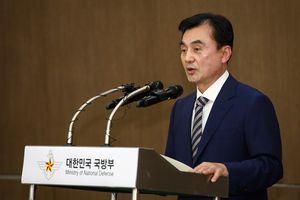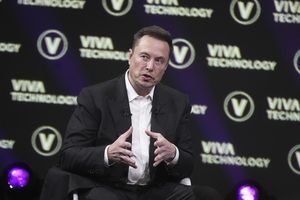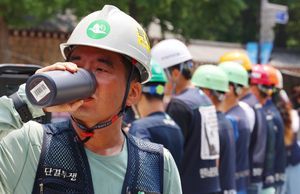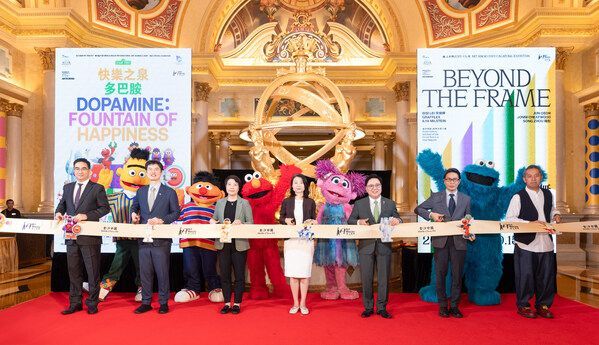![Bang Se-hwan, mayor of Gwangju, Gyeonggi Province (courtesy of Gwangju City Government)]](https://contents-cdn.viewus.co.kr/image/2025/07/CP-2023-0309/30648624.jpg) Bang Se-hwan, mayor of Gwangju, Gyeonggi Province (courtesy of Gwangju City Government)
Bang Se-hwan, mayor of Gwangju, Gyeonggi Province (courtesy of Gwangju City Government)
City data reveals a remarkable growth trajectory. Gwangju’s population, which stood at 324,000 in 2015, surpassed the 400,000 mark in 2022 and reached 412,600 by June 2025. The city’s international appeal is also on the rise, with the number of foreign residents increasing from 11,477 to 15,312 during the same period.
Mayor Bang Se-hwan is spearheading an ambitious initiative to prepare the city for a population of 500,000.
In an exclusive interview with The Korea Herald, Bang outlined his administration’s growth strategy, which focuses on bolstering transportation and housing infrastructure to meet the surging demand from commuters and new residents.
\”Expanding our transportation network is crucial to accommodating half a million residents,\” Bang explained. \”We’re prioritizing upgrades to our road and rail systems to enhance both livability and regional connectivity.\”
Bang pointed to the recent opening of the Anseong-Guri section of the Sejong-Pocheon Expressway as a game-changer for the region.
\”The travel time between Anseong and Guri has been slashed from 88 minutes to just 39,\” he noted. \”This dramatic improvement in accessibility is expected to boost logistics efficiency and attract new businesses to our area.\”
Complementing this, the city is investing 59.2 billion KRW (44.4 million USD) this year to enhance its internal road network. The improvements span three residential zones – Opo-Gyeongan, Choywol-Gonjiam, and Namhansanseong-Toechon – and include new bypasses, ramp connections, and road widening projects.
Gwangju is also pushing for the expansion of its rail network, including extensions to the Gyeonggang Line and new routes such as the GTX-D high-speed line and the Pangyo-Opo light rail.
\”The Gyeonggang Line is already one of the most congested metropolitan rail routes due to insufficient train capacity,\” Bang pointed out. \”As the Gwangju-Icheon-Yeoju region continues to develop, we anticipate even greater demand.\”
To accommodate the influx of new residents, Gwangju is planning two major housing developments near Gwangju and Gonjiam stations. These projects, set to break ground in 2027 and finish by 2030, will add thousands of new homes to the city’s housing stock.
Reflecting on his tenure, Bang shared that his most impactful memories come from his time on the city streets, not in office meetings.
\”The frustration of citizens stuck in daily traffic jams was palpable,\” he recalled. \”That sense of urgency drove us to overhaul the entire bus and transfer system. We believe that effective governance happens on the ground, and that principle has guided all our initiatives.\”
Beyond infrastructure, Bang has been working to elevate Gwangju’s cultural profile and international standing.
He cited the successful hosting of the 2024 WASBE Conference, a prestigious international wind band event, as a notable achievement.
Looking ahead, Bang is focused on two major events he sees as opportunities to boost Gwangju’s brand: the 2025 Korea Forest Expo and the 2026-2027 Gyeonggi Province Sports Festival.
This October, Gwangju will host the Korea Forest Expo at Gonjiam Ceramic Park. The event will showcase environmental policy exhibitions, forest-related products, and offer family-friendly nature experiences. Meanwhile, preparations for the sports festival are well underway, with the main stadium over 80% complete and on track for completion later this year.
Environmental sustainability is another cornerstone of Gwangju’s long-term vision.
The city is developing a state-of-the-art bio-gas facility capable of processing 190 metric tons of organic waste daily, converting it into energy through fuel cell technology.
Gwangju has also joined ICLEI, a global network of local governments committed to sustainable urban development. Additionally, the city is constructing Korea’s largest Wood Education Center and developing a natural recreation forest near Paldang Lake.
As Gwangju stands at a critical juncture in its development, Bang remains optimistic about the future.
\”We’re meticulously managing each project to ensure our citizens experience tangible improvements in their daily lives,\” he affirmed. \”Our ultimate goal is to create a city where everyone aspires to live – a truly self-sustaining Gwangju.\”










Most Commented